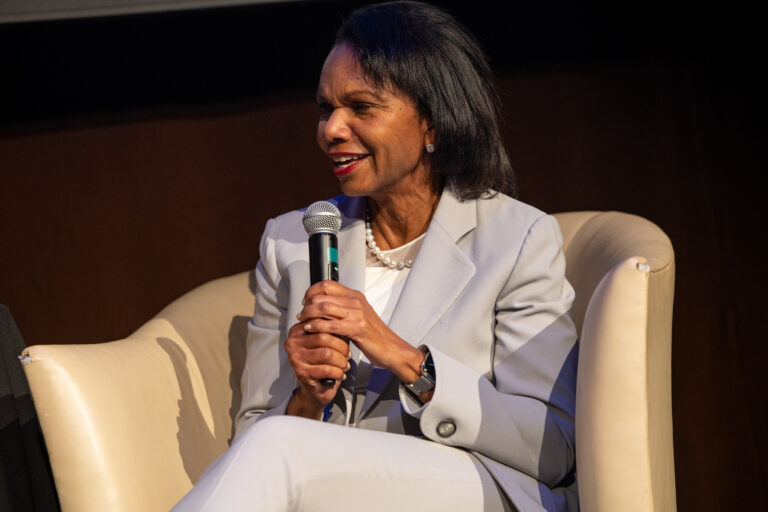Korbel Honors: Celebrating 60 years of the Josef Korbel School of Global and Public Affairs
Published 06/10/2025 - The sentiment hit home at the annual gathering to honor the faculty, staff, and alumni who embody the ideals and values of the Josef Korbel School of Global and Public Affairs: education, democracy, and service. The uncertainty of global affairs was not lost on the crowd, especially this year on the 60th anniversary of the school’s founding. “We find ourselves at a momentous point in history,” added Dean of the Korbel School Fritz Mayer. “It is a remarkably challenging time, and there’s been no other moment — certainly in my lifetime — where so much was changing.”
However, it was not so different for the founder of the Korbel School, the late international relations professor Josef Korbel. The Czechoslovakian native worked as a European diplomat immediately following World War II (during which he fled to London to escape the Nazi invasion), but immigrated with his family to the United States in 1948 to avoid the Communist takeover of Czechoslovakia. With a promising diplomatic future in the rearview, Dr. Korbel redirected his energy toward academia, where it became apparent that few international affairs professors at the time possessed his rare blend of real-life diplomatic experience and intellectual curiosity about the principles of democracy—and the need to uphold it. He parlayed that into the debut of DU’s Graduate School of International Studies in1964 and remained at the university until his death in 1977. In 2008, the school was renamed to honor his legacy.
Korbel alumna and keynote speaker Dr. Rice (PhD ’81) is living proof of Korbel’s legacy. With trademark eloquence, she reflected on her journey from would-be music major at DU to mentee of Josef Korbel; to provost and professor of political science at Stanford University; and to her appointment as the 66th U.S. Secretary of State—the second woman to serve as such after the late Madeleine Albright, Dr. Korbel’s daughter. And her vision for democracy is rooted right here in the teachings of her mentor. “I knew I wanted to be somebody who did a lot of the things that Dr. Korbel had done: diplomacy, the study of foreign cultures and languages…He opened the world of the Soviet Union to me…He always said that mentors are people who see things in you that you don’t even see in yourself.” Dr. Korbel did indeed share his gift of diplomatic acumen with both his daughter and Dr. Rice—something he excelled at in part because of his extensive firsthand experience.
Dr. Rice was the last student that Dr. Korbel taught. She recalled a remark he once made in class that democracy is “the only system where human dignity can be fully realized. So he was fundamentally devoted to the democratic enterprise,” she said. “There are now people in the world and even in our own country who aren’t so sure [they share that view].” Now is not the time, she argued, to sit back and wait for those people to come around. Rather, it’s a time to tackle conflicting values head-on.
In fact, 60 years ago when Dr. Korbel founded the school (currently ranked 12th in the world for international relations graduate programs), world forces as we knew them were shifting then as well. The conflict in Vietnam was escalating, passage of the Voting Rights Act spurred the larger Civil Rights Movement forward, and the Space Race between the United States and the Soviet Union was gaining momentum. “We were a school founded … by a generation who was grappling with the great issues of that time,” said Dean Fritz Mayer. “How to avoid a third world war, how to address international development, how to tackle human rights—these were the salient issues of that moment.”
For Dean Mayer, these are the most important questions faculty and staff tackle together. “How do we prepare our students for the challenges of today?” he asks. “The challenges they’re likely to face in their career?” Engaging with these pivotal issues still remains at the heart of Korbel’s ethos, even when the weight of uncertainty and drastic change is daunting. Because when the avalanche stops, digging out will require savvy tools, sharp strategy, innovation, and grit. And, as each of the 2025 Korbel award recipients pointed out, our government, institutions, NGOs, and businesses will need the kinds of smart, engaged leaders that the Korbel School matriculates to grab shovels when the slide clears.
That’s where Korbel students shine, said Beth Ingalls, (B.A. ’96), Division Chief at the U.S. Department of State and recipient of the 2025 Distinguished Alumni Award. “The Korbel School promotes meaningful action through their programs,” she said. “They’re promoting democracy, human rights, and protection of national security. All of these issues will continue to be extremely important regardless of who is in the White House.”

